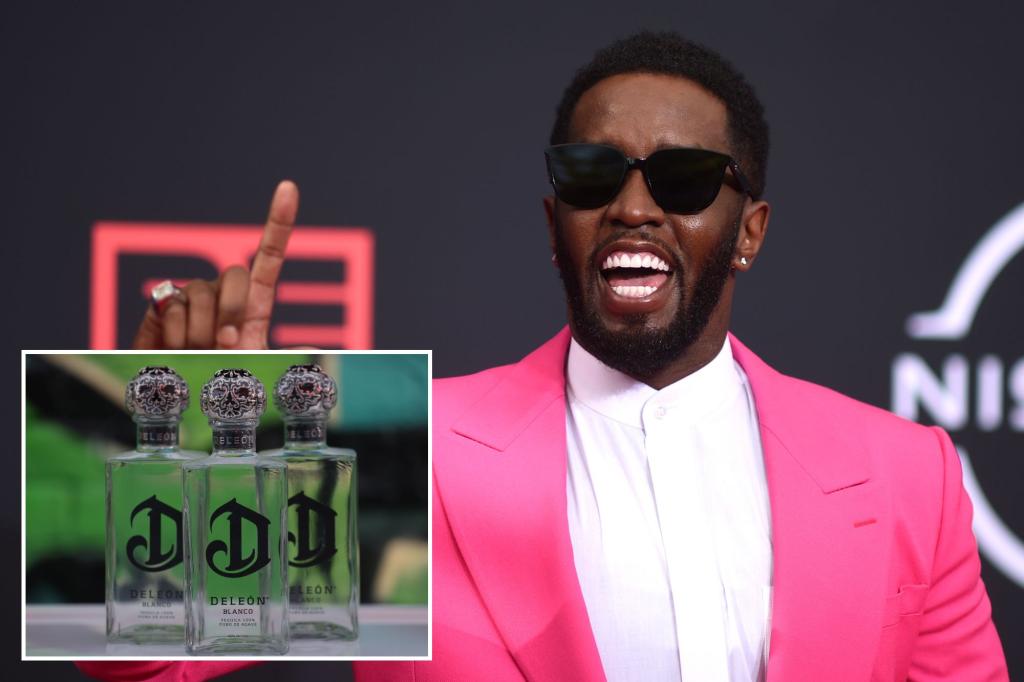Sean “Diddy” Combs accused his business partner Diageo of “illegal retaliation” on Wednesday, heightening the legal battle between the mogul musician and the spirits conglomerate.
Diageo, which had distributed the rapper’s Ciroc vodka and DeLeon tequila brands, moved to cut ties with Combs last month after he filed a suit accusing the company of racism in the promotion and distribution of his liquor labels.
“The message is clear — if you dare to shed light on Diageo’s conduct, you will be punished,” Combs’ lawyers said in documents filed in New York State Supreme Court on Wednesday and obtained by The Post.
Diageo, the world’s largest spirits company, has asked the court to toss the lawsuit.
However, the filing called Diageo’s motion to dismiss the case “smoke and mirrors,” and asked the court to ignore the request.
“While Diageo has self-servingly misrepresented the goals of Combs’s lawsuit in the press, its attempt to retaliate against Combs for asserting his legal rights will not work in court,” Combs’ lawyer John Hueston said.

A Diageo spokesperson told The Post: “This is a business dispute and should not be recast as anything other than that.”
The company insisted it had the contractual right “to terminate the marketing services agreement in place for Ciroc and begin the wind down of the DeLeón joint venture.”
“Our actions are consistent with our desire to protect the significant investment we have made in both brands and their future growth. Mr. Combs’ longstanding bad faith actions, false accusations and breaches of contract overwhelmingly support Diageo’s justified decision to sever ties,” the spokesperson said.
The legal feud began in May when Combs alleged Diageo “sabotaged” his DeLeón brand with shoddy packaging that “made the product look cheap,” according to the complaint.

Combs, 53, claimed that Diageo “did not support [DeLeón and Ciroc] as promised, repeatedly failing to provide sufficient support for production, distribution and sales,” according to court documents.
The filing alleged Diageo’s classification system labeled Ciroc and DeLeón as “urban,” “African American” and “black” brands based on a “misguided belief that a black entrepreneur could only appeal to others who shared his skin color.”
Meanwhile, Diageo “invested more than $1 billion to acquire and grow” George Clooney’s Casamigos tequila brand, the complaint pointed out.
It also noted that the company marketed Casamigos “to consumers of all races, leading to billions in sales” despite “only having white founders.”
Though the court documents didn’t point out how much money Diageo poured into Ciroc and DeLeón, it claims that Combs was pivotal in helping “struggling Ciroc” go “from a meager 75,000 cases in annual sales to millions in just a few years.”

In Diageo’s motion to dismiss Combs’ complaint, however, the company stated it poured “over $100 million” into the DeLeón venture and alleged Combs only made a “$1,000 initial capital contribution.”.
Combs’ attorney refuted the claim, saying “Combs has satisfied all his obligations under his DeLeón joint venture agreement, including funding.”
Hueston said Combs’ agreement with Diageo called on the company to fund the joint venture and “be primarily responsible for ensuring sufficient production and distribution.”
In turn, Combs “would use his global popularity and reach to market DeLeón to consumers, distributors, and retailers, an immense and significant value to the DeLeón brand.”
Combs’ relationship with Diageo dates to 2007, when the London-based company — which owns more than 200 brands, including Guinness beer and Tanqueray gin — approached Combs about Ciroc.
Combs has reportedly taken home nearly $1 billion throughout his tie-up with Diageo.
𝗖𝗿𝗲𝗱𝗶𝘁𝘀, 𝗖𝗼𝗽𝘆𝗿𝗶𝗴𝗵𝘁 & 𝗖𝗼𝘂𝗿𝘁𝗲𝘀𝘆: nypost.com
𝗙𝗼𝗿 𝗮𝗻𝘆 𝗰𝗼𝗺𝗽𝗹𝗮𝗶𝗻𝘁𝘀 𝗿𝗲𝗴𝗮𝗿𝗱𝗶𝗻𝗴 𝗗𝗠𝗖𝗔,
𝗣𝗹𝗲𝗮𝘀𝗲 𝘀𝗲𝗻𝗱 𝘂𝘀 𝗮𝗻 𝗲𝗺𝗮𝗶𝗹 𝗮𝘁 dmca@enspirers.com


